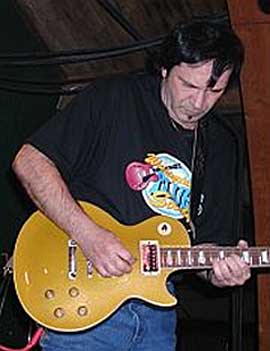
Bellingham-based guitarist's life reflects his Gypsy heritage

Music has a deep, personal meaning for Hungarian-born musician Lou Szepvolgyi.
Reprinted from the Lynden Tribune
B.B. King once said the blues is not
so much music as it is emotion. Hungarian-born blues musician Lou Szepvolgyi, understands fully what the master bluesman, is talking about.
An American citizen since 1995 and
now living in Bellingham, Lou, the youngest of three children, was born in Hungary during the Soviet invasion of 1956. He grew up knowing only occupation and the constant threat of arrest.
Lou was locked up many times, from a few hours to days at a time -- the longest stretch was 21 days -- always for reasons never told him by the authorities. "Usually, they would say it was an anonymous phone call," Lou said.
The Communists could lock down the citizens, but they couldn't block the airwaves. "My friends and I would hang out in the park and listen to Radio Free Europe broadcasts in Hungarian and coming out of Munich," Lou said. "We listened because of the music and between the music we would get news. Pretty soon we started listening more to the news and began discovering the lies in the Russian broadcasts."
His musical tastes were honed listening to Ten Years After, Deep Purple, Led Zeppelin and other early British rock bands, all playing music influenced by American blues.
Lou didn't even pick up a guitar until an older friend who played literally pushed the instrument into Lou's hands. Born left-handed, Lou learned to play the guitar right-handed, not knowing any better, and to this day he is thankful.
"Left-handed guitars are so hard to find. Many companies don't even make them," Lou said.
He taught himself to play and there was no looking back. He and his friends soon formed a band in Hungary, emulating the music they heard on the radio.
"We would have to apply for a license to get paid gigs and they revoked our license," Lou said.
When he was 18, the chief of police told him he was going to be arrested and thrown into jail for four to five years if he continued to play unsanctioned music without a proper license.
That was enough for Lou, and he applied for a visa to travel to Vienna, where another friend had already defected. It took Lou a year-and-a-half of dodging police and KGB agents before he was given a passport.
"The KGB had two ways to get rid of people," Lou said. "They would give you a passport knowing you would leave, or they would give you a passport and then trap you at the border.
They would stop the bus and make everybody get off and then search the luggage. The vias were only goof for three-day trips and you had to buy a round-trip ticket. When they searched the luggage they would look for people taking too many pairs of shoes or pants or having too much money with them. Or, they would plant something in your luggage," Lou said.
His friend in Vienna warned him of this routine, so Lou traveled light and put a lock on his bag. Even in Vienna Lou wasn't safe. He and a handful of others looking to defect had to make a sudden run for a bus that would take them to a refugee camp where they would be safe. But even standing in the line outside the camp, KGB agents had an agreement with Viennese officials whereby they could pull Hungarian citizens out of the line for deportation.
Lou escaped the clutches of the Soviets and spent a year in Vienna, getting clearance to enter either the United States or Australia. A Scandinavian couple in Fargo, N.D., eventually sponsored him to come to the U.S.
All his band mates from Hungary emigrated, with his former drummer locating in Vancouver, B.C. After bouncing from Philadelphia to Florida, Lou came to the Pacific Northwest to visit his old friend in 1989 and has lived in Bellingham since.
Having left his homeland andá parents behind, Lou has plenty of emotion to associate with the blues. But his many different reasons come down to two: his parents.
"I began playing the blues when my father died," Lou said. A soft-spoken and energetic talker, Lou gets uncharacteristically quiet when talking about his parents.
"It's ironic because during the revolution, my parents had a brief opportunity -- the border was open for three days -- when they could have left the country. But they told me later they decided they couldn't go because they had three young children.
"Had they been able to see the future that me and my sisters would all leave, they probably would have tried to leave, just for the chance to keep the family together," Lou said.
His parents are both gone now, but they live on in his music. "I play the blues for them. It's a way to make up not being with them all those years," Lou said. "All of my life is dedicated to my parents. I love them. They are irreplaceable."
Lou's energy returns when talking about his Gypsy Lou Band. The group's name reflects his cultural heritage, with Hungary's population being 33 percent Gypsy.
"My mom was a singer and her brother was a locally famous violinist, " Lou said, adding that his particularly unique playing style includes playing violin lines with his guitar.
He's always looking to learn new sounds and to incorporate them into his music. The latest flavor he's added to the repertoire is Cajun. Lou has also found that playing traditional horn lines with his guitar adds a new twist.
A consummate musician, Lou loves to play and can be found at venues throughout the Pacific Northwest. When he's in town, you might catch him at any open mike night in the area, especially at the Wild Buffalo in Bellingham.
Take a look around our website to get a feel for the type of music we offer. You can also contact us via email or by using one of the other traditional methods shown below.
 PO Box 667
PO Box 667
Bellingham, WA 98225
Phone: 360-738-9610
|
